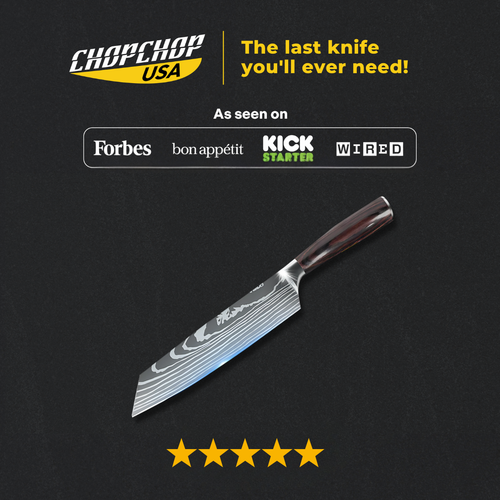Are Titanium Cutting Boards Resistant to Bacteria? Yes, they are naturally hygienic and safe for daily kitchen use. Titanium’s smooth, non-porous surface prevents liquids, food particles, and bacteria from being absorbed, making cleaning easy and reducing contamination risks.
In this guide, ChopChop USA will explain why are titanium cutting boards resistant to bacteria, compare them with other types of cutting boards, provide practical cleaning tips, and introduce top products that combine hygiene, durability, and convenience.
Why Material Matters for Hygiene
The material of a cutting board plays a key role in kitchen hygiene. Porous materials like wood and bamboo can trap moisture, food particles, and bacteria in their tiny pores and scratches. Plastic boards, though non-porous, can develop grooves over time that harbor germs.
Titanium, however, is naturally non-porous and smooth, making it far less susceptible to bacterial growth. Choosing a titanium cutting board ensures a consistently clean surface, reduces the risk of cross-contamination, and provides peace of mind when preparing food for your family or guests.
How Titanium Cutting Boards Resist to Bacteria?

Yes, titanium cutting boards are highly resistant to bacteria. The non-porous surface prevents food particles and liquids from seeping into the board, which limits bacterial growth.
Unlike wood or plastic boards, titanium does not absorb odors, colors, or moisture, making it easier to sanitize. Its corrosion-resistant and smooth finish ensures that bacteria cannot hide in scratches or grooves.
While no board is completely impervious to bacteria, titanium provides a safe, long-lasting, and low-maintenance option for home cooks and professional chefs who prioritize hygiene and kitchen safety.
Comparing Titanium Boards to Other Cutting Boards
When it comes to hygiene, titanium cutting boards outperform most traditional options.
Wood Boards

Are Wooden Cutting Boards Safe? Wood is naturally antimicrobial to some extent, but its porous structure absorbs moisture and food particles. Over time, scratches and cuts create spaces for bacteria to grow. Regular cleaning can reduce risk, but wood boards require extra care to maintain hygiene.
See more: Titanium vs Wooden Cutting Board – Which Is Better?
Plastic Boards

Are Plastic Cutting Boards Safe? Plastic is non-porous initially, making it easy to clean. However, repeated use can cause grooves and scratches where bacteria accumulate. Plastic boards can also retain odors and colors from foods like garlic, onion, or tomato.
See more: Titanium vs Plastic Cutting Board – Which Is Better?
Bamboo Boards

Is a Bamboo Cutting Board Good? Bamboo is harder than most woods and has some antimicrobial properties. Still, it’s slightly porous and can develop cracks over time. Bacteria may survive in these imperfections, especially if the board is not dried thoroughly after washing.
See more: Titanium vs Bamboo Cutting Board – Which Is Better?
Titanium Boards

Are Titanium Cutting Boards Safe? Are titanium cutting boards resistant to bacteria? Yes. Titanium cutting boards are smooth, non-porous, and corrosion-resistant. They don’t absorb liquids, odors, or bacteria, making cleaning simple and effective. Titanium boards are ideal for high-use kitchens because they maintain their hygienic surface over time, even with daily chopping, slicing, and dicing. Additionally, titanium boards resist warping, cracking, and scratches, which further reduces bacteria buildup.
Overall, titanium provides a superior hygienic solution compared to wood, plastic, or bamboo, making it the best choice for safety-conscious home cooks and professional chefs alike.
Cleaning and Maintenance Tips for Titanium Cutting Boards
Even though titanium boards are highly resistant to bacteria, proper cleaning and maintenance ensure they remain safe and hygienic. So, How to Clean a Titanium Cutting Board Properly?
Rinse Immediately After Use
After chopping, rinse the board with warm water to remove food residue. This prevents particles from drying and sticking, reducing bacteria growth.
Use Mild Soap or Dishwasher
Titanium boards can be washed with mild detergent and a soft sponge. Many are also dishwasher-safe, allowing for thorough cleaning without damaging the board. Avoid harsh chemicals or abrasive scrubbers that can scratch the surface.
Dry Completely
Always dry your titanium board fully after washing. Even though it resists moisture absorption, standing water can attract bacteria on the surface or countertop. Use a clean towel or air-dry upright to prevent water pooling.
Sanitize Periodically
For extra protection, sanitize the board with a diluted vinegar solution or a food-safe disinfectant. Titanium’s smooth, non-porous surface makes this quick and effective, keeping your board bacteria-free.
Following these simple tips ensures your titanium cutting board remains hygienic, safe, and long-lasting for daily kitchen use.
Introduce ChopChop USA Cutting Boards
ChopChop USA Cutting Boards are designed for durability, hygiene, and everyday kitchen convenience. Crafted from premium materials like titanium, they provide a safe, bacteria-resistant surface that makes meal prep easier and more efficient. Perfect for home cooks and professional chefs alike, these cutting boards combine innovation with practical design.
ChopChop USA Titanium Cutting Board

The ChopChop USA Titanium Cutting Board is highly-rated as one of the Best Titanium Cutting Boards in the market. It offers a smooth, non-porous surface that naturally resists bacteria, odors, and stains. Its corrosion-resistant titanium construction ensures long-lasting durability, making it ideal for daily chopping, slicing, and dicing. Lightweight yet strong, it provides a hygienic and low-maintenance option for kitchens focused on safety and efficiency.
Key Features:
- Smooth, non-porous, and bacteria-resistant surface
- Corrosion-resistant and durable titanium construction
- Easy to clean and dishwasher-safe
- Lightweight and ergonomically designed for comfort
- Resistant to odors, stains, warping, and scratches
ChopChop USA Double-Sided Titanium Cutting Board

The ChopChop USA Double-Sided Titanium Cutting Board is also rated as one of the Best Cutting Board for Knives 2025. It adds versatility to hygiene and durability. With two functional surfaces, it allows you to separate raw and cooked foods or different ingredients, reducing cross-contamination. Like all titanium boards, it resists bacteria, odors, and moisture, making it a safe, long-lasting, and convenient choice for busy kitchens.
Key Features:
- Two functional sides for versatile food prep
- Smooth, non-porous, and bacteria-resistant titanium surface
- Corrosion- and scratch-resistant for long-term use
- Easy to maintain
- Ideal for separating raw and cooked foods or different ingredients
Read more:
- Do Titanium Cutting Boards Slide Around?
- Can You Use a Titanium Cutting Board for Cutting Frozen Food?
- Will a Titanium Cutting Board Warp Under High Heat?
- Can I use Harsh Cleaners on A Titanium Cutting Board?
Conclusion
So, are titanium cutting boards resistant to bacteria? Yes. Titanium cutting boards are highly resistant to bacteria due to their smooth, non-porous, and corrosion-resistant surface. Unlike wood, plastic, or bamboo boards, they are easy to clean, do not absorb moisture, and remain hygienic over time.
ChopChop USA offers high-quality Titanium Cutting Boards and Double-Sided Titanium Cutting Boards that combine durability, hygiene, and convenience. Choosing titanium ensures a safe, bacteria-resistant surface, giving home cooks and professional chefs peace of mind during every meal prep.
For more amazing recipes, follow us on Facebook and Instagram! If you have any questions about ChopChop USA's products or promotions, please feel free to contact us at support@chopchopusa.com. Our dedicated team is available 24/7 and always happy to assist you.
Frequently Asked Questions
1. Are titanium cutting boards resistant to bacteria completely?
They are highly resistant but proper cleaning is still recommended.
2. Can titanium boards be washed in the dishwasher?
Yes, most ChopChop USA titanium boards are dishwasher-safe.
3. How often should I sanitize my titanium cutting board?
Periodically or after handling raw meats and seafood.
4. Are titanium boards better than plastic or wood for hygiene?
Yes, due to their non-porous, smooth surface that resists bacteria.
5. Do titanium boards retain odors or stains?
No, the non-porous surface prevents absorption of odors and colors.




